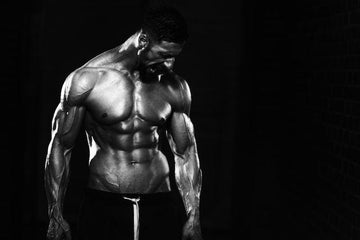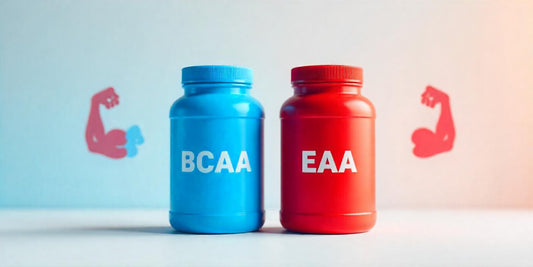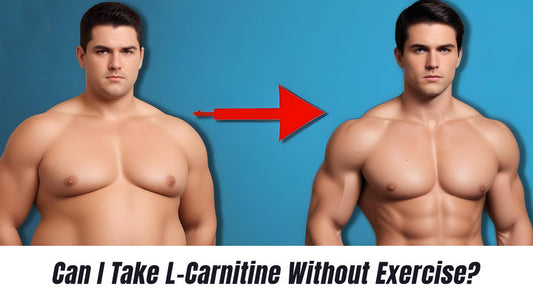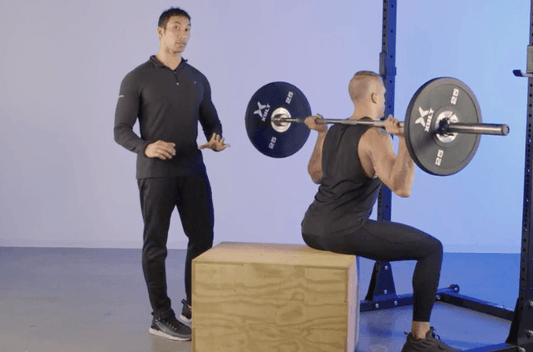

Sweat it Off? Science or Fitness Myth?
Table of Contents
Will Sweating More Increase Weight Loss? by IFBB Pro Joe Palumbo
The more you sweat, the harder you’re working, which would also mean more calories burned, right….wrong.
For many sweat feels like success, its challenge accomplished.
Sweating in and of itself doesn’t mean that you’re burning calories, as a matter of fact women have more sweat glands than men, but men’s glands are more active, so plain and simple they sweat more. Sweat is not a gauge of how hard you are working. Perspiration is affected by how hot it is whether or not you smoke or drink coffee or cocktails — smoking, caffeine, and alcohol can increase perspiration. Fat also acts as an insulator, so overweight people sweat more than those of normal weight. It is the work that your occupied in that eats up calories; sweating is just a side effect of the workout. Simply put, sweat is really just your body’s way of getting rid of heat. It isn’t necessarily an indication of workout intensity or the amount of calories and fat that you’re burning. Our bodies produce sweat as a way to cool down, so if anything, it’s a good indicator of how hot your body is.
The Plastic Sweat Suits
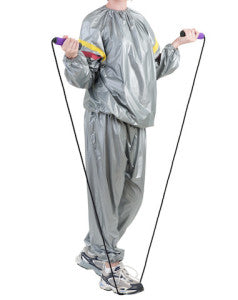
The classic quick fix, worn by those who are looking to maximize their workouts for greater weight loss. Plastic suits have been used by athletes and even wrestlers in an attempt to quickly lose weight. Sweat suits became famous with athletes who have to drop a significant amount of weight in a short span of time. It is common for boxers, martial artists and weightlifters to wear sweat suits right before a weigh in or even during pre-contest training to lose a few extra pounds. This difference in weight is only water weight; however it did not stop companies from using this trend as a way to promote their suits as fat-burning aids. This is nothing more than a scam. Exercising while wearing one can result in health complications. The water loss can be extremely dangerous. As you prevent your sweat from evaporating, your body is unable to adequately cool itself. This can lead to overheating, which can result in heat stroke. The increase in fluids that you lose will cause you to become dehydrated, which will adversely affect your blood volume. As a result, you may be unable to provide your heart or brain with adequate oxygen and a stroke or heart attack can result.
In reality, it’s the intensity of your workout that determines calories burned and not the amount you sweat. Any weight loss experienced immediately after a workout is only water weight, and you’ll gain it right back as soon as you rehydrate yourself. What matters is how long and how intensely you’re working out. If you go for a 30-minute run and you haven’t sweated a drop, you still burned almost 300 calories.
Losing body fat has nothing to do with how much you sweat. The Truth is the fitter you are, the less you probably sweat. In order to permanently lose weight, you must burn more calories than you consume. Thus, increasing how many calories you burn by exercising regularly and decreasing the number of calories you consume by eating healthy are two recommended techniques for successful weight loss. Train safe, Train smart.
 About the Author;
About the Author;
Joseph Palumbo is an IFBB Professional Bodybuilder, Certified Trainer (SMART)
Advance Sports Nutrition Specialist (ASNS) and Certified Navy Seal Fitness Instructor.
Contact info;
www.infinitelabs.com
MUSCLE MEDIA MAGAZINE FOR MEN
The premier source of training, nutrition, supplements, fat loss and health for men.


